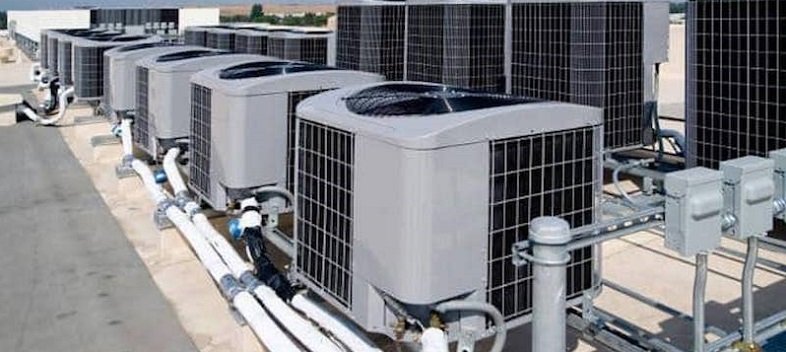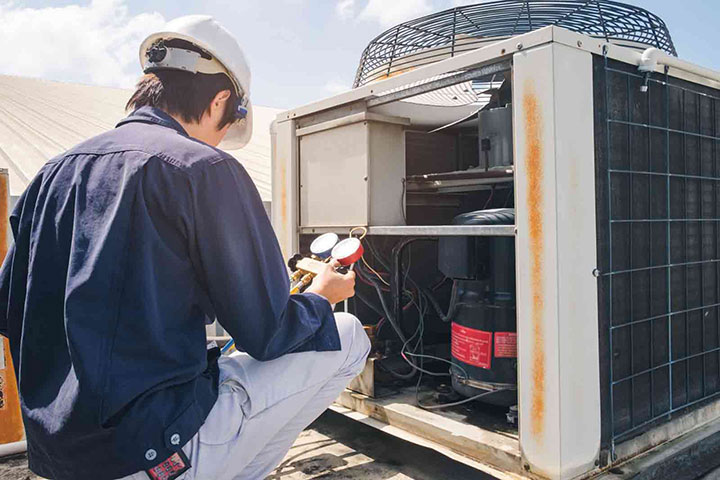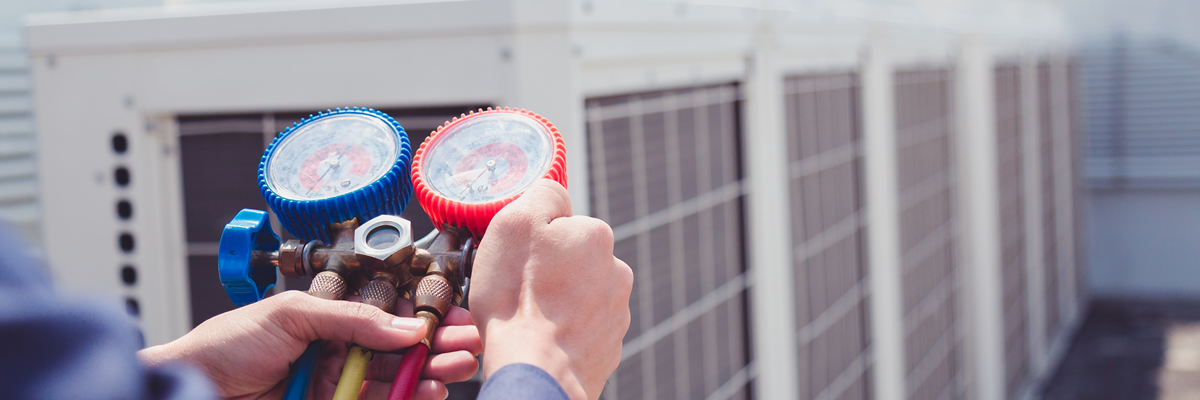Exactly How a Heat Pump and Heating System Interact to Enhance Your Home's Home heating Efficiency
Recognizing just how a heatpump and heater collaborate is essential for house owners seeking reliable home heating options. Each system has its strengths, supplying a balanced technique to home convenience. The heat pump stands out in modest temperature levels, while the heater provides rapid heat during extreme cold. This harmony not only reduces power costs yet likewise enhances the lifespan of both appliances. What aspects affect this partnership, and just how can homeowners optimize their advantages?
Recognizing Warmth Pumps: Exactly How They Work
Although many individuals may be unfamiliar with their internal operations, heatpump play an important role in modern heating unit. These gadgets run by moving warm from one location to another, utilizing the concepts of thermodynamics. In chillier months, a warm pump extracts heat from the outdoors air, ground, or water, and transfers it indoors to warm the living space. On the other hand, throughout warmer months, it can turn around the procedure, serving as an air conditioning system by eliminating warmth from inside to the outside.Heat pumps include an evaporator, expansion, condenser, and compressor valve. The refrigerant within the system absorbs warm as it vaporizes at low temperatures and stress. The compressor after that boosts the stress and temperature of the cooling agent, enabling it to release warm as it condenses. This reliable procedure can considerably lower power intake compared to traditional heating techniques, making warm pumps a lasting selection for climate control in homes.
The Function of Heaters in Home Home Heating
Heaters play an essential duty in home heating by offering a trustworthy resource of heat throughout the colder months. They run by creating warmth via burning or electrical resistance, dispersing it throughout the home by means of air ducts or glowing systems. The performance of a heating system is usually gauged by its Yearly Gas Application Effectiveness (AFUE) rating, which suggests how efficiently the system converts gas into heat.Furnaces can use different energy resources, including gas, electrical energy, oil, or propane, permitting home owners to pick one of the most ideal alternative for their needs. Unlike warmth pumps, which may battle in severe cold, heaters keep constant performance, guaranteeing that interior temperature levels stay comfy regardless of exterior conditions. In addition, modern-day furnaces often come geared up with innovative technology, such as wise thermostats and variable-speed blowers, enhancing their performance and responsiveness. This versatility makes heaters a vital component in all-inclusive home heating methods.

Advantages of Utilizing Both Systems With Each Other
Combining the toughness of both furnaces and warmth pumps can cause a more efficient and effective home heating remedy. Making use of both systems permits home owners to make the most of the heatpump's power efficiency during milder temperature levels while relying upon the heating system for even more extreme cold conditions. This dual approach can significantly minimize power prices, as heatpump take in much less electrical energy than standard heating techniques when temperatures are moderate.Additionally, making use of both systems with each other can enhance convenience levels in the home. Heatpump can supply consistent, even heating, while furnaces can rapidly raise ambient temperature levels when needed. The integration of both systems can extend the life expectancy of devices by minimizing wear and tear on each system, as they share the work. Ultimately, property owners can enjoy a well balanced, affordable home heating remedy that changes perfectly to differing climate condition, making certain a warm and inviting home throughout the winter season.
Exactly How Warm Pumps and Furnaces Enhance Each Other
They produce a corresponding heating system that makes the most of performance and convenience when home owners integrate heat pumps and furnaces. Heat pumps run by transferring heat from the outside air or ground, making them highly efficient in moderate environments. They excel during milder temperature levels, supplying cost-effective heating. Alternatively, heaters create warm with burning or electrical resistance, supplying solid, prompt warmth throughout extreme chilly conditions.The combination of these 2 systems allows for dynamic adjustments based on temperature fluctuations. During warmer months or milder winter season days, the heat pump can take the lead, preserving power and decreasing expenses. As temperature levels decline, the heater can effortlessly engage, making sure regular warmth throughout the home. This synergy not only enhances power use but additionally improves the lifespan of both systems, as each system runs within its perfect performance variety. With each other, they develop a balanced setting that adapts to differing climate needs.
Enhancing Efficiency: Tips for Homeowners
Home owners can boost their heating efficiency via several look at this site functional methods. Establishing a routine maintenance timetable, integrating wise thermostat modern technology, and carrying out efficient insulation and securing services are vital steps. These procedures not only boost convenience but likewise lower energy costs.
Regular Maintenance Arrange
To guarantee maximum heating performance, establishing a regular maintenance schedule is vital for any home. House owners must prioritize routine assessments of both warm pumps and heating systems to ascertain peak performance. This consists of changing air filters each to 3 months, as clogged filters can greatly minimize performance. Additionally, scheduling specialist upkeep at the very least annually enables service technicians to recognize and attend to prospective problems prior to they intensify. Property owners must also clean the heatpump's outside unit to avoid debris build-up that can prevent airflow. By sticking to a normal maintenance schedule, homeowners not only boost their home heating systems' performance however additionally prolong their life-span, resulting in higher comfort and lowered energy expenses throughout the cooler months.
Smart Thermostat Integration
Incorporating a smart thermostat right into a home heating system can considerably enhance energy performance, specifically as it enables precise control over temperature level settings. These gadgets can learn the homeowner's timetable and preferences, instantly adjusting the temperature level to optimize comfort while reducing power use. They can lower home heating during times when the home is empty, decreasing unneeded consumption. Numerous smart thermostats also supply real-time energy usage information, enabling home owners to make enlightened decisions concerning their home heating practices. Furthermore, remote access through mobile phone apps enables customers to adjust setups from anywhere, making certain view website the home is cozy upon return. Generally, smart thermostat integration not only boosts comfort but significantly adds to energy savings and performance.
Insulation and Sealing Solutions
Smart thermostats play a crucial role in energy performance, but their performance can be greatly enhanced by proper insulation and securing remedies. Property owners need to prioritize shielding floorings, attic rooms, and wall surfaces to reduce warm loss. High-grade insulation products, such as spray foam or fiberglass, can substantially boost thermal resistance. Furthermore, securing spaces around doors, home windows, and ducts prevents cold air infiltration and warmth retreat. Weatherstripping and caulking work approaches for addressing these leaks - heat pump replacement ooltewah tn. Normal assessments for air leakages, in addition to the use of blower door tests, can help identify trouble areas. By buying insulation and securing, house owners can maximize the efficiency of their home heating systems, ultimately causing reduced energy intake and reduced energy costs
Usual Myths Regarding Heat Pumps and Furnaces
What mistaken beliefs border heatpump and heaters? Numerous people wrongly think that heatpump are inadequate in cooler climates. Actually, modern-day heat pumps are developed to operate efficiently also in low temperatures, giving reliable heating throughout winter. Another common myth is that heaters are constantly much more efficient than heatpump. This depends on the particular power sources and efficiency scores of the devices in inquiry. Some might likewise believe that making use of both systems concurrently is unnecessary, however in fact, this mix can enhance heating efficiency, specifically during severe climate conditions. In addition, individuals frequently assume that warmth pumps require consistent maintenance, when actually, they have similar upkeep needs to conventional home heating systems. By debunking these myths, property owners can make more enlightened decisions concerning their heating alternatives, check out here eventually bring about improved convenience and energy efficiency in their homes.
Upkeep Considerations for Combined Systems

Often Asked Questions
Can Heat Pumps Job Efficiently in Incredibly Cold Climates?
Heatpump can have a hard time in incredibly cool environments due to minimized effectiveness and warm extraction constraints. Nevertheless, improvements in modern technology have brought about models created for far better efficiency in such conditions, boosting their viability in rough environments.
Just How Long Do Warm Pumps and Furnaces Normally Last?
Heatpump typically last 15 to 20 years, while heating systems have a life expectancy of 15 to 30 years. Routine upkeep can extend their durability, ensuring effective operation and reducing the requirement for early replacements.

What Is the Average Expense of Putting Up Both Equipments?
The typical expense of installing both a heatpump and a heater usually ranges between $5,000 to $10,000 - heat pump service. Aspects influencing this price consist of system dimension, installment intricacy, and regional labor rates
Exist Tax Incentives for Making Use Of Energy-Efficient Home Heating Solutions?
Numerous property owners ask about tax motivations for energy-efficient furnace. Numerous federal and state programs usually supply rebates or debts, motivating the fostering of sustainable modern technologies to reduce power intake and promote environmental duty.
How Do I Pick the Right Size Heatpump and Heating System?
Picking the right size heat pump and heating system includes computing the home's square footage, considering insulation top quality, and examining regional environment. Consulting a specialist can guarantee ideal system performance and power effectiveness based on certain requirements. furnace replacement. Comprehending exactly how a warm pump and furnace work with each other is vital for property owners seeking reliable heating options. In colder months, a warm pump extracts heat from the outside air, ground, or water, and transfers it inside your home to warm up the living room. When property owners integrate heat pumps and heaters, they develop a complementary home heating system that maximizes performance and convenience. Heat pumps run by transferring warm from the outdoors air or ground, making them extremely effective in moderate climates. Warmth pumps can have a hard time in extremely chilly climates due to minimized efficiency and heat removal limitations